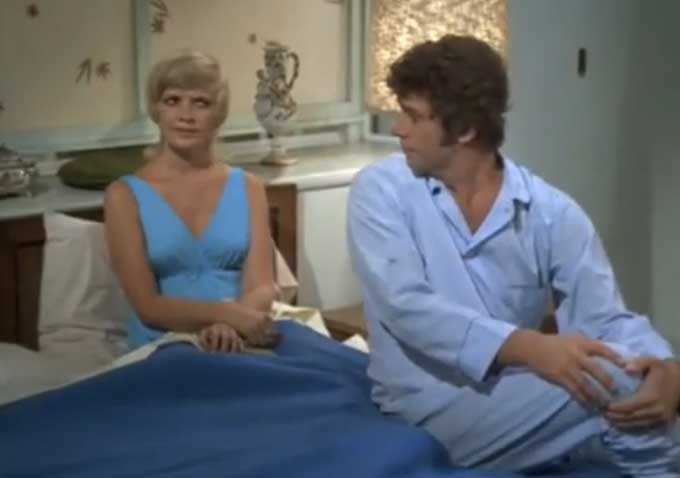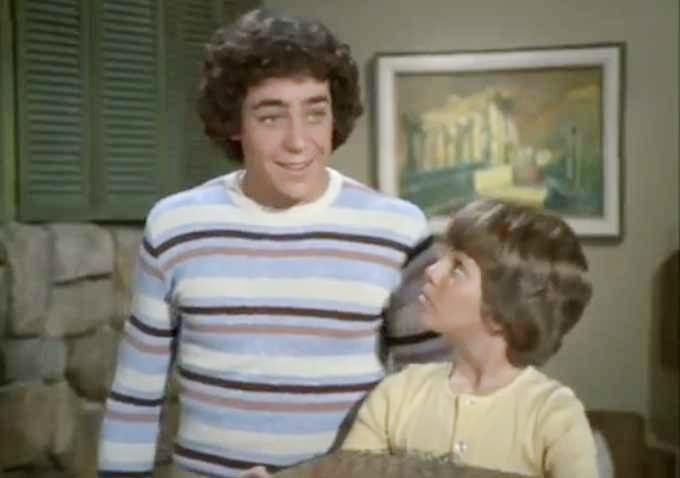By providing your information, you agree to our Terms of Use and our Privacy Policy. We use vendors that may also process your information to help provide our services. This site is protected by reCAPTCHA Enterprise and the Google Privacy Policy and Terms of Service apply.
Growing Up Is Hard To Do: ‘The Brady Bunch’ and How Greg Brady Taught Himself a Lesson About ‘Exact Words’
Aaron Dobbs

Editor’s Note: This is part three in a series of five articles looking at memorable depictions of coming of age on television — a favorite topic on the small screen, from “Leave It To Beaver” to “Pretty Little Liars.” It’s presented in partnership with Participant Media’s new network Pivot and its series “Please Like Me,” about a 20-year-old man (Josh Thomas) who still has a lot to figure out about identity, love and family. Catch all six episodes back-to-back at 8pm ET/7pm CT on Thursday, August 1.
Few people would characterize “The Brady Bunch” as a complex portrayal of adolescence. The episodes adhered to a standard family sitcom formula: the kids engaged in a bit of mischief, believed they control the situation and have fooled their parents, only later to learn from the experience. But even within the context of a fantasy world somewhat removed from the contemporaneous reality of Nixonian America, “The Brady Bunch” provided a relatable version of adolescent struggles with identity, responsibility and character that connected with its younger audiences. Within the limited purview of an adolescent, the smallest problems can become the most important and urgent crises.
“Brady Bunch” creator Sherwood Schwartz took the familiar sheen of 1950s family sitcoms featuring a working dad, stay-at-home mom and some cute-but-troublemaking kids and gave it a late-’60s twist while maintaining a clean-cut (and white, natch!) appearance. As the theme song famously describes, the Bradys were more complicated than the Cleavers. (For those unfamiliar with this “story of a lovely lady who was bringing up three very lovely girls” and the “story of a man named Brady, who was busy with three boys of his own,” get the full story here.)
 Those who paid attention to the pilot episode, in which Mike (Robert Reed) and Carol (Florence Henderson) got married, may remember that Mike was a widower, but the issue of the boys’ late mother is never again addressed. And what about the girls’ biological father? Had he died too? Or were they the product of a broken home? “Brady Bunch” lore states that Schwartz imagined Carol as a divorcee, but the network considered that too controversial for the times. So the subject was avoided, and the transformation of this bunch into a singular nuclear family, all using the Brady name with no mention of missing parents happened almost immediately.
Those who paid attention to the pilot episode, in which Mike (Robert Reed) and Carol (Florence Henderson) got married, may remember that Mike was a widower, but the issue of the boys’ late mother is never again addressed. And what about the girls’ biological father? Had he died too? Or were they the product of a broken home? “Brady Bunch” lore states that Schwartz imagined Carol as a divorcee, but the network considered that too controversial for the times. So the subject was avoided, and the transformation of this bunch into a singular nuclear family, all using the Brady name with no mention of missing parents happened almost immediately.
“The Brady Bunch” either ignored its contemporary context or hoped to provide an escape from it; most likely, ABC and/or Paramount wanted it to do both. The Bradys first hit TV screens in the fall of 1969 — the year after the assassinations of Robert Kennedy and Dr. Martin Luther King Jr. — and at the height of protests over the Vietnam War and the draft. And yet, even as the show whitewashed its era and own premise, Schwartz and his team focused on depicting an honest — albeit narrow — representation of the issues facing adolescents, often paying particular attention to the ambiguity or nuance that lies between the all-or-nothing reality expressed by many pre-teens and teenagers.
Season four’s “Greg Gets Grounded” addresses this idea directly. Series aficionados — generally those of us who experienced the show not in primetime but as a daily, after-school companion in the late ’70s and early ’80s — will more likely remember it as the “exact words” episode. Bobby (Mike Lookinland) told his parents that Greg (Barry Williams) almost got into a car accident because he was reading the back of a new record album, so Mike prohibited Greg from driving “the” car for a week. But Greg had promised his girlfriend that he would take her to “the big rock concert” on Saturday night. In a plotline that might baffle anyone born after 1990, Greg rode his bike to all the music stores in the neighborhood looking for tickets, but all the shops were sold out.
 Greg borrowed a friend’s car to drive to the stadium where he can still get tickets. Mike and Carol thought he flagrantly disobeyed them, not believing he didn’t realize he was prohibited from driving any car, but Greg claimed Mike said he just couldn’t drive “our” car. Greg asked if going forward they could all agree to communicate by “exact words,” a phrase which quickly became overused. Naturally, Greg thought he’d outwitted his parents in a very respectful way, but Mike knew better and assured Carol that living by “exact words” wouldn’t be as easy as Greg believed.
Greg borrowed a friend’s car to drive to the stadium where he can still get tickets. Mike and Carol thought he flagrantly disobeyed them, not believing he didn’t realize he was prohibited from driving any car, but Greg claimed Mike said he just couldn’t drive “our” car. Greg asked if going forward they could all agree to communicate by “exact words,” a phrase which quickly became overused. Naturally, Greg thought he’d outwitted his parents in a very respectful way, but Mike knew better and assured Carol that living by “exact words” wouldn’t be as easy as Greg believed.
Of course it isn’t, and Greg suffered the consequences when Mike and Carol wouldn’t relieve him of his promise to take Bobby and Peter to a frog-jumping competition that conflicted with the concert. (That’s right: A pet store organized a “huge” frog-jumping competition for 8pm on a Saturday night.) Luckily, Greg’s girlfriend was very understanding, even after one of the frogs jumped onto her head later that night at a drive-in movie. Greg realized that “exact words” weren’t all they’re cracked up to be.
“The Brady Bunch” operated under the assumption that the best life lessons were those learned through personal experience. In this case, Greg thought he was getting exactly what he wanted, only to discover that he could have used the ability to say, “But that’s not what I meant.” Along the way, he had the love and support of two parents who trusted that he’d learn this lesson better on his own.
 Within the limited and innocent reality of “The Brady Bunch,” the stakes were rarely set too high. The show was more concerned with maintaining television’s utopian vision of the American suburban ideal. Although a large portion of its audience may not identify with this idealized conjoining of two broken but white and upper-middle-class homes, most kids probably can still relate to Greg’s feelings of being treated unfairly; to his desire to believe like he’s manipulated his parents into letting him do what he wants; and to discovering that sometimes, the grown-ups actually know better.
Within the limited and innocent reality of “The Brady Bunch,” the stakes were rarely set too high. The show was more concerned with maintaining television’s utopian vision of the American suburban ideal. Although a large portion of its audience may not identify with this idealized conjoining of two broken but white and upper-middle-class homes, most kids probably can still relate to Greg’s feelings of being treated unfairly; to his desire to believe like he’s manipulated his parents into letting him do what he wants; and to discovering that sometimes, the grown-ups actually know better.
Indiewire has partnered with Pivot and its new series “Please Like Me.” (Binge-watch the whole season starting at 8pm ET/7pm CT on Thursday, August 1, with a total of six back-to-back episodes.) “Please Like Me” is a comedic-drama based on actual painfully awkward events from the life of 25-year-old, award-winning Australian comedian Josh Thomas. Watch the first episode here, as in the span of 24 hours, Josh is dumped by his girlfriend, realizes he may be gay and moves in with his mother, who has just attempted suicide. All of a sudden, it seems as though everyone’s life is in disarray and Josh is at the center of it all.
By providing your information, you agree to our Terms of Use and our Privacy Policy. We use vendors that may also process your information to help provide our services. This site is protected by reCAPTCHA Enterprise and the Google Privacy Policy and Terms of Service apply.
















